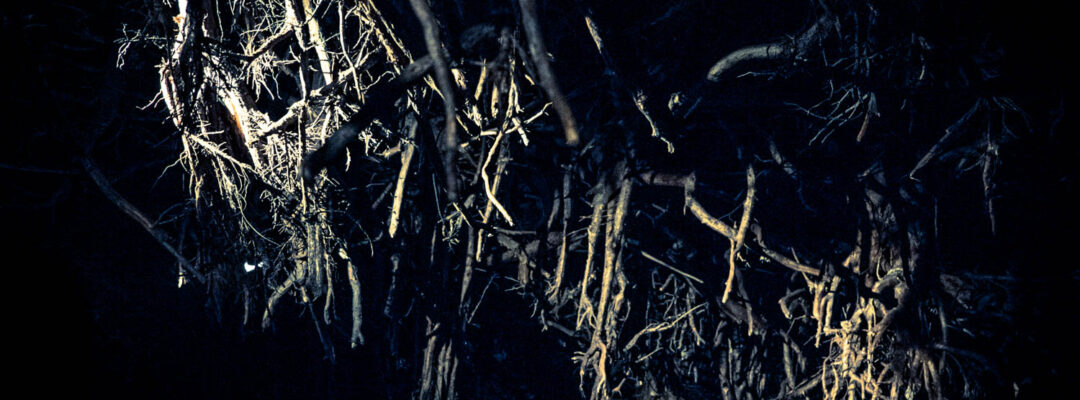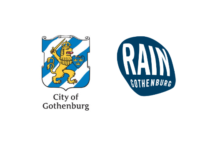The Cultural Adaptations conference in March 2021 brought together artists, organisations and sustainability practitioners from around the world, enabling them to share their experiences in climate change and adaptation. Jolanta Sikorska, an artist and activist based in Warsaw, is currently working on her script for a documentary play, that deals with the very broad topic – the loss of survival instinct by humans. This blog is inspired by her attendance at the conference.
THE FUTURE
One winter evening while I was visiting Warsaw’s Zach?ta Art Gallery I saw Joanna Rajkowska‘s installation Rhizopolis. It was a futuristic set design for a non-existent science fiction film about a bleak vision for the future of our planet. I entered a sparsely lit room where forest litter lay on the floor and tree roots hung from the ceiling. Suddenly I found myself underneath the earth, underneath the forest. It was warm and quiet there and I felt as if I were in my mother’s belly. I felt safe and wanted to lie down on the floor and fall asleep. Rajkowska’s vision assumes that, due to a series of cataclysms, human beings will be forced to live and breathe underground in the safety of tree roots. I began to wonder if such an adaptation would really be necessary. A shelter for the human species provided by trees, whose elaborate root system will make underground survival caves possible. It sounds like science fiction, doesn’t it.. or maybe not at all?
THE PRESENT
One winter day I was travelling on the tram across the city when I suddenly got stuck in the middle of the bridge due to the blockade of traffic by young people with the green banners of Extinction Rebellion. It was my first encounter with this global environmental movement, and since then I started appearing and supporting XR protesters at all subsequent demonstrations and protests in Warsaw. I was very impressed by the calmness of the activists, which was in contrast to the aggressive, violent behaviour of the police or nervosity of honking drivers.
Another activist group that is very active in Poland is the Camp for the Forest. It is a group of people working together to protect the Bialowie?a Forest, the last remaining part of the European primeval forest. They believe that there is a need for civic mobilisation, because petitions and other similar actions have proved insufficient. Thus, they decided to launch the Camp for the Protection of the Forest, a place that fosters peaceful direct actions aimed at protecting this unique place from ongoing devastation.
The outbreak of COVID-19 showed clearly that a rapid mass mobilisation of people is possible and we can make changes really quickly if they are necessary. It is high time to acknowledge that we are facing a climate and ecological emergency and we must put similar thinking into action to stop the environmental pollution and planet destruction in order to preserve it for future generations. Our approach to the Earth must change
THE PAST
One winter morning I had a conversation with a miner who worked in a mine in Lower Silesia. Mining has a very long tradition in Poland. The Structural Research Institute reports that 78,500 people were employed by seven mining companies in Upper Silesia in 2019. The majority of citizens and activists are aware of the need for change in energy production and know that mine closures are necessary. Unfortunately, our government does not yet recognise this. Also, due to the strong tradition of mining in Poland, numerous groups of miners block such a change.
SOIL, TREE, COAL
I am writing my script as part of a documentary theatre course at the Jerzy Grotowski Institute in Wroc?aw. The main materials for the script are interviews I have been conducting with artists, activists and miners. I’m mainly interested in their motivations and how they see the process of adaptation to irrevocable changes that are bound to come. In the case of artists the question is how can they recycle art? For activists, what means of expression (maybe some shocking measures) can be used to talk about the climate crisis to draw more attention to the subject? And for miners, what will the future be like for them once the mines are shut down? Unfortunately I have an impression that there is still complete denial and total unawareness of climate change among people in Poland. That is the reason why I decided to make a spectacle to bring more awareness about the subject as in my opinion there is nothing more urgent.
THE CAVE
Documentary theatre is characterised by focusing on emotions of characters, giving voice to protagonists. I want my script to have the features of a drama, i.e. I want to give voice to both sides, because there are always two sides in a dispute.
I am at the beginning of collecting documentary material, but I have already had some interesting interviews. There will be a performative reading of an excerpt from my script as part of the Night on the Facts Festival in June 2021. And in autumn 2021, I hope to premiere it at the 59 Minute Theatre in Warsaw.
I am also a cave explorer so being underground is my natural environment. I would like my audience to go underground with me and experience all the relationships that exist between soil, roots and coal.
As an artist and educator, I believe that active participation and direct experience has the power to change the world.
Jolanta Sikorska
teatr@59minut.pl














